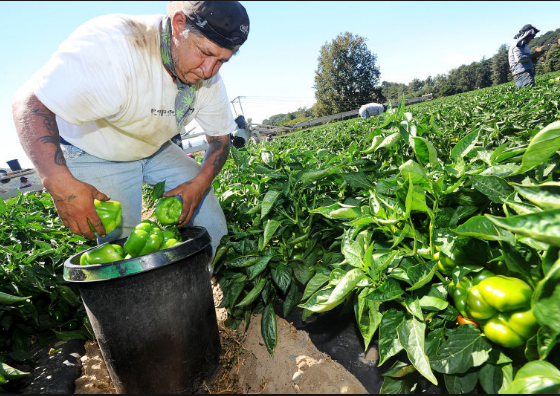Farmworkers praised the signing of a new law that pays them the same wages as other industries, but Gilroy’s biggest agricultural company said it could be a disaster for the workers.
After decades of controversy, Gov. Jerry Brown on Monday signed a law that will pay overtime to farmworkers who work more than eight hours a day or 40 hours a week.
“We’re extremely grateful to Jerry Brown for doing the right thing and correcting an historic wrong,” said United Farm Workers President Arturo Rodriguez. “We’re excited he signed the legislation and corrected an historic wrong committed nearly 80 years ago against farmworkers in the United States.”
However, Bill Christopher, who manages the state’s largest garlic producer, Christopher Ranch, said the law would end up hurting farmworkers.
“We just won’t have guys work 10 hours a day,” said Christopher, whose company employs 1,000 seasonal workers. “We can’t afford the overtime. We’ll just have to hire more employees at less hours.”
Christopher said farmworkers prefer working 10 hours a day and 60-hour weeks during the season and saving the money for when they aren’t working. Having to pay them more after 40 hours will encourage farmers to use machines, rather than laborers, he said, defeating the purpose of the law designed to get more money for workers.
He added that it would make it more difficult for local farmers to compete with those abroad who have cheaper labor costs.
The median pay for farmworkers is $20,000 a year, according to the Bureau of Labor Statistics.
Rodriguez scoffed at Christopher’s claims, saying that there was no reason for farmworkers to be treated differently than other workers, even seasonal ones.
“All I’ve heard for two years is that there is a tightening of the labor force and there aren’t enough workers,” he said. “Farmers are discing their crops, not able to harvest them. I can’t imagine they won’t have workers to work all the hours they need and finally treat them the way all other industries are treated. Why is the agricultural industry so much different? It’s really disappointing that growers don’t value farmworkers the way other industries value workers.”
Nationally, in 1938 the Fair Labor Standards Act set minimum wage and hourly limits for labor, but excluded agricultural workers.
In California, farmworkers were shut out of earning overtime pay from 1941 until 1976, when they were only able to collect overtime after 10 hours a day or 60 hours a week—while workers in all other industries collected overtime at eight hours a day and 40 hours a week.
In a series of compromises, the new law will be phased in over four years, starting in 2019, and the threshold for overtime pay will reduce from 10 hours to eight, a half-hour per year. It can be suspended for a year in the event of economic crisis.
“We’re not the only seasonal industry,” said Rodriguez. “There’s seasonal work in the restaurant and hotel industries and many others, yet farmworkers are treated differently.”














